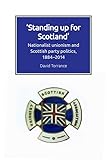Standing Up for Scotland : Nationalist Unionism and Scottish Party Politics, 1884-2014 / David Torrance.
Material type: TextPublisher: Edinburgh : Edinburgh University Press, [2022]Copyright date: ©2020Description: 1 online resource (256 p.)Content type:
TextPublisher: Edinburgh : Edinburgh University Press, [2022]Copyright date: ©2020Description: 1 online resource (256 p.)Content type: - 9781474447812
- 9781474447836
- 320.54094109411
- online - DeGruyter
| Item type | Current library | Call number | URL | Status | Notes | Barcode | |
|---|---|---|---|---|---|---|---|
 eBook
eBook
|
Biblioteca "Angelicum" Pont. Univ. S.Tommaso d'Aquino Nuvola online | online - DeGruyter (Browse shelf(Opens below)) | Online access | Not for loan (Accesso limitato) | Accesso per gli utenti autorizzati / Access for authorized users | (dgr)9781474447836 |
Browsing Biblioteca "Angelicum" Pont. Univ. S.Tommaso d'Aquino shelves, Shelving location: Nuvola online Close shelf browser (Hides shelf browser)

|

|

|

|

|

|

|
||
| online - DeGruyter ReFocus : The Films of Spike Jonze / | online - DeGruyter The Ethics of Political Resistance : Althusser, Badiou, Deleuze / | online - DeGruyter Against Continuity : Gilles Deleuze's Speculative Realism / | online - DeGruyter Standing Up for Scotland : Nationalist Unionism and Scottish Party Politics, 1884-2014 / | online - DeGruyter Diversity and Integration in Private International Law / | online - DeGruyter The Pragmatics of Fiction : Literature, Stage and Screen Discourse / | online - DeGruyter Reading Victorian Literature : Essays in Honour of J. Hillis Miller / |
Frontmatter -- CONTENTS -- Acknowledgements -- ONE / Prelude -- TWO / Nationalist Unionism -- THREE / ‘Every Scotsman Should Be a Scottish Nationalist -- FOUR / ‘Scottish Control of Scottish Affairs -- FIVE / Scottish (Conservative and) Unionist Party: Rise and Fall -- SIX / The Liberals and ‘Scottish Self-Government -- SEVEN / The Scottish Labour Party and ‘Crypto-Nationalism -- EIGHT / The SNP and ‘Five Continuing Unions -- NINE / ‘ The Fair Claims of Wales -- TEN / Northern Ireland and ‘Ulster Nationalism -- ELEVEN / Conclusion -- Endnotes -- Bibliography -- Index
restricted access online access with authorization star
http://purl.org/coar/access_right/c_16ec
A history of ‘hidden’ nationalism in Scottish party politicsHighlights the hidden ‘nationalism’ of the Scottish Unionist/Conservative Party and extends this analysis to Scottish Labour and Liberal parties Examines the ‘unionism’ of the Scottish National Party (SNP) for the first time Draws on high-circulation media resources such as the Scottish Daily Express – breaking the scholarly reliance on the less-read Herald and ScotsmanMakes use of hitherto-neglected archive material, including the Scottish Political Archive in Stirling and the Parliamentary Archives at WestminsterDavid Torrance reassesses the relationship between 'nationalism' and 'unionism' in Scottish politics, challenging a binary reading of the two ideologies with the concept of 'nationalist unionism'. Scottish nationalism did not begin with the SNP in 1934, nor was it confined to political parties that desired independent statehood. Rather, it was more dispersed, with the Liberal, Conservative and Labour parties all attempting to harness Scottish national identity and nationalism between 1884 and 2014, often with the paradoxical goal of strengthening rather than ending the Union. The book combines nationalist theory with empirical historical and archival research to argue that these conceptions of Scottish nationhood had much more in common with each other than is commonly accepted.
Mode of access: Internet via World Wide Web.
In English.
Description based on online resource; title from PDF title page (publisher's Web site, viewed 27. Jan 2023)


